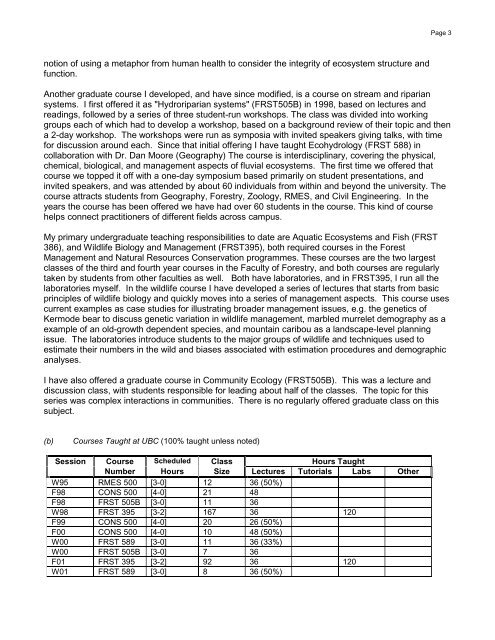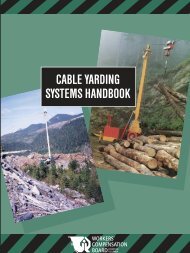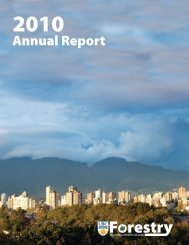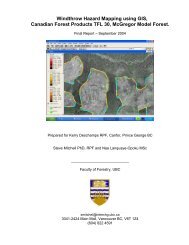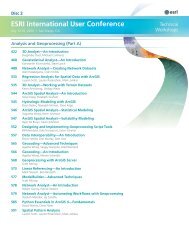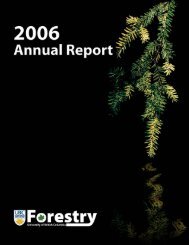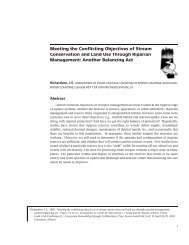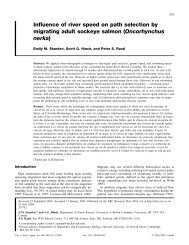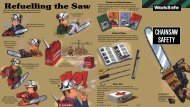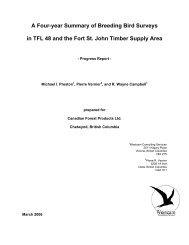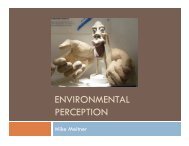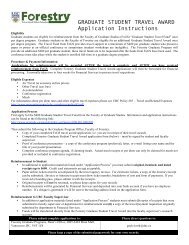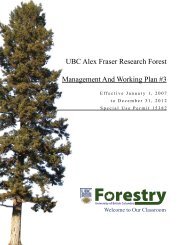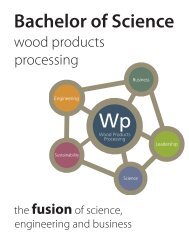THE UNIVERSITY OF BRITISH COLUMBIA - Courses
THE UNIVERSITY OF BRITISH COLUMBIA - Courses
THE UNIVERSITY OF BRITISH COLUMBIA - Courses
Create successful ePaper yourself
Turn your PDF publications into a flip-book with our unique Google optimized e-Paper software.
Page 3notion of using a metaphor from human health to consider the integrity of ecosystem structure andfunction.Another graduate course I developed, and have since modified, is a course on stream and ripariansystems. I first offered it as "Hydroriparian systems" (FRST505B) in 1998, based on lectures andreadings, followed by a series of three student-run workshops. The class was divided into workinggroups each of which had to develop a workshop, based on a background review of their topic and thena 2-day workshop. The workshops were run as symposia with invited speakers giving talks, with timefor discussion around each. Since that initial offering I have taught Ecohydrology (FRST 588) incollaboration with Dr. Dan Moore (Geography) The course is interdisciplinary, covering the physical,chemical, biological, and management aspects of fluvial ecosystems. The first time we offered thatcourse we topped it off with a one-day symposium based primarily on student presentations, andinvited speakers, and was attended by about 60 individuals from within and beyond the university. Thecourse attracts students from Geography, Forestry, Zoology, RMES, and Civil Engineering. In theyears the course has been offered we have had over 60 students in the course. This kind of coursehelps connect practitioners of different fields across campus.My primary undergraduate teaching responsibilities to date are Aquatic Ecosystems and Fish (FRST386), and Wildlife Biology and Management (FRST395), both required courses in the ForestManagement and Natural Resources Conservation programmes. These courses are the two largestclasses of the third and fourth year courses in the Faculty of Forestry, and both courses are regularlytaken by students from other faculties as well. Both have laboratories, and in FRST395, I run all thelaboratories myself. In the wildlife course I have developed a series of lectures that starts from basicprinciples of wildlife biology and quickly moves into a series of management aspects. This course usescurrent examples as case studies for illustrating broader management issues, e.g. the genetics ofKermode bear to discuss genetic variation in wildlife management, marbled murrelet demography as aexample of an old-growth dependent species, and mountain caribou as a landscape-level planningissue. The laboratories introduce students to the major groups of wildlife and techniques used toestimate their numbers in the wild and biases associated with estimation procedures and demographicanalyses.I have also offered a graduate course in Community Ecology (FRST505B). This was a lecture anddiscussion class, with students responsible for leading about half of the classes. The topic for thisseries was complex interactions in communities. There is no regularly offered graduate class on thissubject.(b)<strong>Courses</strong> Taught at UBC (100% taught unless noted)Session Course Scheduled Class Hours TaughtNumber Hours Size Lectures Tutorials Labs OtherW95 RMES 500 [3-0] 12 36 (50%)F98 CONS 500 [4-0] 21 48F98 FRST 505B [3-0] 11 36W98 FRST 395 [3-2] 167 36 120F99 CONS 500 [4-0] 20 26 (50%)F00 CONS 500 [4-0] 10 48 (50%)W00 FRST 589 [3-0] 11 36 (33%)W00 FRST 505B [3-0] 7 36F01 FRST 395 [3-2] 92 36 120W01 FRST 589 [3-0] 8 36 (50%)


